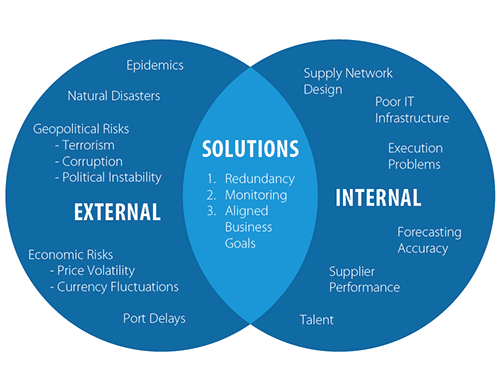A truly global supply chain builds its success on flexible, well-integrated systems by accommodating customer requirements.
The advent of technological advances has created a world in which there are truly no boundaries when it comes to international trade. In order for businesses to maintain or increase their competitive advantage, there must be a continuous effort to increase profits by forging strategic relationships globally. Occasionally, this relationship is formed with lower-cost (and often distant) partners to increase current capacity and expand the supply chain network. Access to these new markets directly results in a more global supply chain. Notwithstanding the many benefits of globalization, the interdependencies that complicate the global supply chain create inherent risks which are equally important to consider.
The complexity associated with a global supply chain requires careful identification and assessment of potential risks to the supply base. These risks can be classified into two main categories, external and internal. Internal risks are those resulting from the implementation of operational strategy or factors within a firm’s control; external risks are those outside a firm’s control.

External Risk Factors
As a company expands its global operation network, its supply chain strategy must also adjust to accommodate the international risks involved. The external factors to consider are environmental, geopolitical and economic risks—each having varying degrees of mitigation influence. Environmental events such as natural disasters or epidemics are the least likely to be controlled as a result of the low probability of prediction; in comparison, political factors such as trade restrictions, regional conflicts or corruption could be influenced prior to trade agreements.
Another important consideration is intellectual property laws and how well they protect shared IP from being transferred to competitors. When deciding on a global supply chain footprint, it’s important to understand the probability of external risk factors and create a mitigation plan for manageable risks that allows for a healthy and successful global supply chain.
Internal Risk Factors
Internal risk factors should be a consideration when a firm identifies and manages the external and internal risks and its ability to execute on strategy. These risk factors are considered internal because they are within a company’s control and sometimes occur as a result of improper systems put in place or the lack thereof. The hidden costs of transportation delays, warehousing and misaligned strategies among business partners can often hinder the major cost benefits of global sourcing.
Managing Risks
Now that the risk factors have been identified and we can understand the level at which each factor can be managed, an implementation plan is critical. There are a multitude of actions to manage supply chain risks, such as implementing a dual sourcing plan supported by the right supply network design strategy. One of the most important aspects of managing risk within a global supply chain is developing a supply base. This means a company’s implementation plan should include the following key activities:
- Develop the right sets of criteria to select suppliers;
- Have the right technology in place for collaboration;
- Determine the right inventory optimization strategy; and
- Plan for supplier development.
Although there are many risks involved in expanding to a global supply chain, they can be managed through continuous innovation, efficiency improvements and flexibility in an ever-changing marketplace. In addition to the above considerations, there are two more requirements for a holistic approach to a successful global supply chain: information technology and talent. Having the right information technology in place allows for monitoring and collaboration with supply partners, enabling faster information transfer. The complexity involved in a global supply chain requires a greater degree of coordination, and the quality of results from risk management is a direct result of having the right people in place.
With the right strategy in place to ensure an agile and adaptive supply chain in an increasingly global marketplace, a firm can maintain its competitive advantage. iBi
Ifechukwu Igboanugo is manager of supplier collaboration and procurement for CGN Global.


